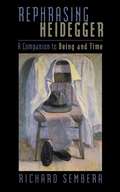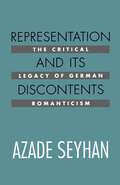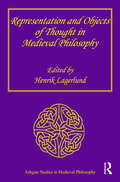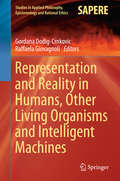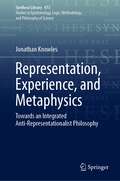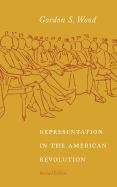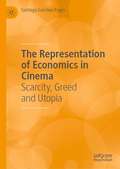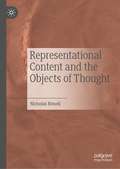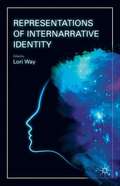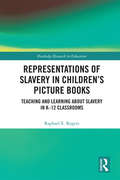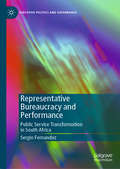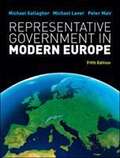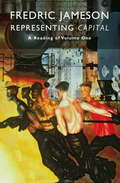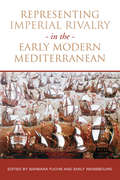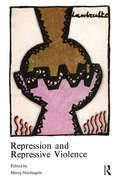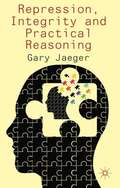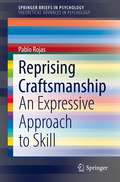- Table View
- List View
Rephrasing Heidegger: A Companion to 'Being and Time' (Philosophica)
by Richard SemberaRichard Sembera introduces the reader to the essential features of BEING AND TIME, Heidegger's main work in clear and unambiguous English. He dispels the nimbus of unintelligibility surrounding Heidegger's thought, a nimbus that Heidegger himself helped create and that has tended to confine serious Heidegger scholarship to closed circles. This is not a work about the "exisistentialist" Heidegger, the "Nazi" Heidegger, the "gnostic" Heidegger, or the "mystic" Heidegger. Nor is is a "diluted" Heidegger for beginners. REPHRASING HEIDEGGER interprets the philosopher on his own terms, covering all the main aspects of BEING AND TIME, and is particularly interesting for its detailed analysis of the structure and contents of this epoch-making philosophical work. REPHRASING HEIDEGGER includes a unique glossary of technical terms which recur frequently throughout BEING AND TIME whose translation is problematic or uncertain. It also includes a German-English lexicon which catalogues the translations of Heidegger's terms in the most important English translations of BEING AND TIME. This is the first detailed commentary in English by a Heidegger specialist trained at Heidegger's own university by the world-renowned Heidegger scholar Prof. F.-W. von Herrman, the editor of the most important volumes of Heidegger's collected works in German.
A Report on China’s Administration Reform (Research Series on the Chinese Dream and China’s Development Path)
by Yukai WANGThis book traces the history of China’s administrative reform in the past 35 years, focusing on the three phases of development, four guidelines and five major tasks of the reform since it is of great value to depict the entire process of China’s administrative system reform, analyzing the achievements, problems and prospects of the reform, and exploring experiences and lessons from the relationship between the administrative system reform and China’s economic, social and government transformation.
Report to Greco
by Nikos KazantzakisDisarmingly personal and intensely philosophical, Report to Greco is a fictionalized account of Greek philosopher and writer Nikos Kazantzakis’s own life, a sort of intellectual autobiography that leads readers through his wide-ranging observations on everything from the Hegelian dialectic to the nature of human existence, all framed as a report to the Spanish Renaissance painter El Greco. The assuredness of Kazantzakis’s prose and the nimbleness of his thinking as he grapples with life’s essential questions—who are we, and how should we be in the world?—will inspire awe and more than a little reflection from readers seeking to answer these questions for themselves.
Representation and Its Discontents: The Critical Legacy of German Romanticism
by Azade SeyhanAzade Seyhan provides a concise, elegantly argued introduction to the critical theory of German Romanticism and demonstrates how its approach to the metaphorical and linguistic nature of knowledge is very much alive in contemporary philosophy and literary theory. Her analysis of key thinkers such as Friedrich Schlegel and Novalis explores their views on rhetoric, systematicity, hermeneutics, and cultural interpretation. Seyhan examines German Romanticism as a critical intervention in the debates on representation, which developed in response to the philosophical revolution of German Idealism.Facing a chaotic political and intellectual landscape, the eighteenth-century theorists sought new models of understanding and new objectives for criticism and philosophy. Representation and Its Discontents identifies the legacy of this formative moment in modern criticism and suggests its relevance to contemporary discussions of post-structuralism, orientalism, theories of textuality, and the nature of philosophical discourse.
Representation and Objects of Thought in Medieval Philosophy (Ashgate Studies In Medieval Philosophy Ser.)
by Henrik LagerlundThe notions of mental representation and intentionality are central to contemporary philosophy of mind and it is usually assumed that these notions, if not originated, at least were made essential to the philosophy of mind by Descartes in the seventeenth century. The authors in this book challenge this assumption and show that the history of these ideas can be traced back to the medieval period. In bringing out the contrasts and similarities between early modern and medieval discussions of mental representation the authors conclude that there is no clear dividing line between western late medieval and early modern philosophy; that they in fact represent one continuous tradition in the philosophy of mind.
Representation and Reality in Humans, Other Living Organisms and Intelligent Machines (Studies in Applied Philosophy, Epistemology and Rational Ethics #28)
by Gordana Dodig-Crnkovic Raffaela GiovagnoliThis book enriches our views on representation and deepens our understanding of its different aspects. It arises out of several years of dialog between the editors and the authors, an interdisciplinary team of highly experienced researchers, and it reflects the best contemporary view of representation and reality in humans, other living beings, and intelligent machines. Structured into parts on the cognitive, computational, natural sciences, philosophical, logical, and machine perspectives, a theme of the field and the book is building and presenting networks, and the editors hope that the contributed chapters will spur understanding and collaboration between researchers in domains such as computer science, philosophy, logic, systems theory, engineering, psychology, sociology, anthropology, neuroscience, linguistics, and synthetic biology.
Representation, Experience, and Metaphysics: Towards an Integrated Anti-Representationalist Philosophy (Synthese Library #473)
by Jonathan KnowlesThis book provides an original perspective on the debate about anti-representationalism and the nature of philosophy. This debate has come to prominence in recent years through the work of people like Richard Rorty, Paul Horwich, Huw Price and Amie Thomasson. It is the first book to explicitly consider this well-known pragmatist kind of anti-representationalism in relation to anti-representationalist views in other areas of philosophy, in particular the philosophy of perception and cognitive science. Taking as its point of departure the neo-pragmatism of Rorty and Price, it critiques the way these (and other) thinkers develop, on this basis, a positive view of philosophy and its remit. By examining the debate about representationalism versus anti-representationalism in perception and cognitive science it provides a different way of understanding the significance of neo-pragmatism, as well as providing an independently interesting perspective on these other debates. A central idea in this perspective involves distinguishing between a world-for-us and a world-in-itself, though in a different way from Kant and many other philosophers. The book extends these reflections to examine questions about realism and the limits of metaphysics for anti-representationalist pragmatism, arguing the view can uphold a common sense kind of realism, as well as the value of distinctively philosophical enquiry in metaphysics.
Representation in Congress
by Hill, Kim Quaile and Jordan, Soren and Hurley, Patricia A. Kim Quaile Hill Soren Jordan Patricia A. HurleyRepresentation in Congress provides a theory of dyadic policy representation intended to account for when belief sharing, delegate, responsible party, trustee, and 'party elite led' models of representational linkage arise on specific policy issues. The book also presents empirical tests of most of the fundamental predictions for when such alternative models appear, and it presents tests of novel implications of the theory about other aspects of legislative behavior. Some of the latter tests resolve contradictory findings in the relevant, existing literature - such as whether and how electoral marginality affects representation, whether roll call vote extremism affects the re-election of incumbents, and what in fact is the representational behavior of switched seat legislators. All of the empirical tests provide evidence for the theory. Indeed, the full set of empirical tests provides evidence for the causal effects anticipated by the theory and much of the causal process behind those effects.
Representation in the American Revolution
by Gordon S. WoodFrom one of America's most celebrated historians, the Pulitzer Prize winner Gordon S. Wood, comes an early work whose relevance is undiminished. Originally published in 1969, now revised and with a new preface, Representation in the American Revolution examines the ways in which a government is created and how, in the face of great difficulties as well as great possibilities, its citizens are represented. Written immediately after the completion of Wood's Bancroft Award-winning The Creation of the American Republic, this book elaborates on issues also explored in that landmark work. The subject is one that lies at the heart of any discussion of democracy. Establishing a proper method of representation was a goal and measure of the American Revolution, or as Thomas Jefferson said in 1776, "the whole object of the present controversy. " A fine example of political and constitutional history, this timeless little book will serve as an excellent introduction to issues of representation for students in the fields of political science, as well as history and law.
The Representation of Economics in Cinema: Scarcity, Greed and Utopia
by Santiago Sanchez-PagesCinema articulates the economic anxieties of each generation of filmmakers and audiences. It has an influence on people’s views on various economic issues and many orders of magnitude larger than that of economics as a discipline. This book offers a sweeping study of the representation of economics in cinema across a wide range of areas and genres, from the conflicts over resources in the lawless Old West to the post-scarcity societies of science fiction futures. This book studies how films have portrayed trade unions, scarcity, money, businesses, innovators, migrant workers, working women, globalization, the stock market, and the automation of work. It aims to be useful to those who are interested in cinema with economic themes and to those who want to learn about economics through cinema.
Representation Rights and the Burger Years
by Nancy MaveetyMaveety argues that the Supreme Court under Burger revolutionized the constitutional view of political representation
Representational Content and the Objects of Thought
by Nicholas RimellThis book defends a novel view of mental representation—of how, as thinkers, we represent the world as being. The book serves as a response to two problems in the philosophy of mind. One is the problem of first-personal, or egocentric, belief: how can we have truly first personal beliefs—beliefs in which we think about ourselves as ourselves—given that beliefs are supposed to be attitudes towards propositions and that propositions are supposed to have their truth values independent of a perspective? The other problem is how we can think about nonexistents (e.g., Santa Claus) given the widespread view that thought essentially involves a relation between a thinker and whatever is being thought about. The standard responses to this puzzle are either to deny that thought is essentially relational or to insist that it is possible to stand in relations to nonexistents. This book offers an error theory to the problem. The responses from this book arise from the same commitment: a commitment to treating talk of propositions—as the things towards which our beliefs are attitudes—as talk of entities that actually exist and that play a constitutive and explanatory role in the activity of thought.
Representational Style in Congress
by Justin GrimmerThis book demonstrates the consequences of legislators' strategic communication for representation in American politics. Representational Style in Congress shows how legislators present their work to cultivate constituent support. Using a massive new data set of texts from legislators and new statistical techniques to analyze the texts, this book provides comprehensive measures of what legislators say to constituents and explains why legislators adopt these styles. Using the new measures, Justin Grimmer shows how legislators affect how constituents evaluate their representatives and the consequences of strategic statements for political discourse. The introduction of new statistical techniques for political texts allows a more comprehensive and systematic analysis of what legislators say and why it matters than was previously possible. Using these new techniques, the book makes the compelling case that to understand political representation, we must understand what legislators say to constituents.
Representations of Internarrative Identity
by Lori WayBased upon Ajit Maan's groundbreaking theory of Internarrative Identity, this collection focuses upon redefining self, slave narrative, the black Caribbean diaspora, and cyberspace to explore the interconnection between identity and life experience as expressed through personal narrative.
Representations of Slavery in Children’s Picture Books: Teaching and Learning about Slavery in K-12 Classrooms (Routledge Research in Education #21)
by Raphael E. RogersDrawing on critical race theory, critical race feminism, critical multicultural analysis, and intertextuality this book examines how slavery is represented in contemporary children’s picture books. Through analysis of recently published picture books about slavery, Rogers discusses how these books engage with and respond to the historiography of the institution of slavery. Exploring how contemporary writers and illustrators have represented the institution of slavery, Rogers presents a critical and responsible approach for reading and using picture books in K-12 classrooms and demonstrates how these picture books about slavery continue to perform important cultural work.
Representative Bureaucracy and Performance: Public Service Transformation in South Africa (Executive Politics and Governance)
by Sergio Fernandez"Representative Bureaucracy and Performance: Public Service Transformation in South Africa is a first-rate blend of quantitative and qualitative analysis of one of the major transitions in modern governance. Fernandez makes a major theoretical contribution to the literature on representative bureaucracy in demonstrating how descriptive representation translates into both active representation and better performance. His discussion of the crucial role of language and communication brings new insight to the literature on public administration and democracy."—Kenneth Meier, Distinguished Scholar in Residence, American University"This study of public sector transformation goes beyond the descriptive qualitative research largely found in South African public administration historiography by undertaking sophisticated quantitative analysis to show that representation of previously historically disadvantaged groups, under certain circumstances, can improve the performance of public organizations. This is an excellent contribution, not only to public administration scholarship in South Africa, but also to the sparse literature on public organizations in developing countries. The book should be of great value to scholars and practitioners of public administration, as well as to students of political science and organizational studies."—Robert Cameron, Professor, University of Cape Town"This book provides an excellent analysis of the theory of representative bureaucracy in the context of South African post-apartheid government. South Africa is an important and fascinating case. The work adds substantially to the literature on representative bureaucracy and will be of interest to all who are concerned with the effectiveness of government organizations."—J. Edward Kellough, Professor, University of GeorgiaGovernments throughout the world seek to promote employment equity and ensure that bureaucracies are representative of the citizenry. South Africa offers a rare and fascinating case for exploring what happens to bureaucracies as they undergo demographic transformation. Grounded in the theory of representative bureaucracy and using a mixed methods approach, this book explores how major changes in the demographics of the South African public service have affected the performance of the institution. The empirical analysis offers compelling evidence that representative bureaucracies perform better. As public organizations become increasingly representative by hiring historically disadvantaged persons, especially Africans, their performance improves, controlling for a range of factors. Evidence indicates representative bureaucracies perform better because they empathize with and advocate for historically disadvantaged communities, are equipped with linguistic and cultural competencies to serve a diverse citizenry, and can induce compliance, cooperation, and coproduction.
Representative Government In Modern Europe
by Gallagher Laver MairFocuses on comparative European politics. This title reflects key events and changes including the impact of the world financial and economic crisis; the EU's adoption of the Lisbon Treaty; and, the election of a centreright governments in Germany and the UK.
Representing Capital
by Fredric JamesonRepresenting Capital, Fredric Jameson's first book-length engagement with Marx's magnum opus, is a unique work of scholarship that records the progression of Marx's thought as if it were a musical score. The textual landscape that emerges is the setting for paradoxes and contradictions that struggle toward resolution, giving rise to new antinomies and a new forward movement. These immense segments overlap each other to combine and develop on new levels in the same way that capital itself does, stumbling against obstacles that it overcomes by progressive expansions, which are in themselves so many leaps into the unknown.
Representing Imperial Rivalry in the Early Modern Mediterranean
by Emily Weissbourd Barbara FuchsRepresenting Imperial Rivalry in the Early Modern Mediterranean explores representations of national, racial, and religious identities within a region dominated by the clash of empires. Bringing together studies of English, Spanish, Italian, and Ottoman literature and cultural artifacts, the volume moves from the broadest issues of representation in the Mediterranean to a case study - early modern England - where the "Mediterranean turn" has radically changed the field.The essays in this wide-ranging literary and cultural study examine the rhetoric which surrounds imperial competition in this era, ranging from poems commemorating the battle of Lepanto to elaborately adorned maps of contested frontiers. They will be of interest to scholars in fields such as history, comparative literary studies, and religious studies.
Representing Space in the Scientific Revolution
by David Marshall MillerThe novel understanding of the physical world that characterized the Scientific Revolution depended on a fundamental shift in the way its protagonists understood and described space. At the beginning of the seventeenth century, spatial phenomena were described in relation to a presupposed central point; by its end, space had become a centerless void in which phenomena could only be described by reference to arbitrary orientations. David Marshall Miller examines both the historical and philosophical aspects of this far-reaching development, including the rejection of the idea of heavenly spheres, the advent of rectilinear inertia, and the theoretical contributions of Copernicus, Gilbert, Kepler, Galileo, Descartes, and Newton. His rich study shows clearly how the centered Aristotelian cosmos became the oriented Newtonian universe, and will be of great interest to students and scholars of the history and philosophy of science.
Representing the Advantaged
by Daniel M. ButlerPolitical inequality is a major issue in American politics, with racial minorities and low-income voters receiving less favorable representation. Scholars argue that this political inequality stems largely from differences in political participation and that if all citizens participated equally we would achieve political equality. Daniel M. Butler shows that this common view is incorrect. He uses innovative field and survey experiments involving public officials to show that a significant amount of bias in representation traces its roots to the information, opinions, and attitudes that politicians bring to office and suggests that even if all voters participated equally, there would still be significant levels of bias in American politics because of differences in elite participation. Butler's work provides a new theoretical basis for understanding inequality in American politics and insights into what institutional changes can be used to fix the problem.
Repression and Repressive Violence
by Marjo HoefnagelsThese papers are the proceedings of the 3rd international working conference on violence and non-violent action in industrialized societies, held in Brussels, on November 3rd-5th, 1976. Political violence is generally understood to be violence used by people who seek to change the existing power structure through rebellion, revolution, coup d’état, etc. It is much less studied from its opposite angle, as violence used by people who seek to consolidate their powerful positions. Such "violence from above’ however, was the subject of an international conference on "Repression and Repressive Violence’, which was organized by the Polemological Centre of the Free University of Brussels (v u b ). The conference provided a unique opportunity for bringing together a number of scholars who had been working on the subject of repressive violence separately, each within his/her scientific discipline
Repression, Integrity and Practical Reasoning
by Gary JaegerRepression receives little attention in philosophical literature. This study of cases of repression that inhibit an agent's deliberative access to his reasons argues that an agent cannot correctly deliberate about a reason to overcome repression as if he did so, he would already have overcome repression and so would have no reason to do so.
Reprising Craftsmanship: An Expressive Approach to Skill (SpringerBriefs in Psychology)
by Pablo RojasCraftsmanship provides an insight into an inherently human dimension of work resulting from our immersion in an occupation or profession. The present book illustrates and defines the vital, social, aesthetic, and ethical dimensions involved in craftsmanship, which rejects a dissociation between handwork and wit, or between action and thought. This also contrasts with the neglect contemporary psychology has shown toward craftsmanship and its reduction to mere ‘human factors.’ Drawing on artistry as an emblem, the present account conveys that skilful action can only be renewed in a cycle involving both the personal and the transgenerational. There is little doubt in psychological and anthropological literature that the current global crises cannot be separated from social predicaments; namely, from the commodification of craftsmanship. In this book, the development of skilful action attests to a fundamental involvement required to sustainably perpetuate human endeavours. The role of expressivity in reappropriating technical activity is key in showing the continuous revaluation of our ethics and aesthetics of work, practice, and creation. The overall arc of the volume shows a movement from responsivity to responsibility. In short, if we are to reformulate our relationship to work and craft, we need to see through our responsibility in technique. The particularities of craftsmanship described here aim to contribute to such reformulation.
Reproducing Fictional Ethnographies: Surrogacy and Digitally Performed Anthropological Knowledge (Palgrave Studies in Literary Anthropology)
by Anna ApostolidouThis book focuses on the example of surrogate motherhood to explore the interplay between new reproductive technologies and new ethnographic writing technologies. It seeks to interrogate the potential of fictional multimodality in ethnography and to illuminate the generative possibilities of digital artefacts in anthropological research. It also makes a case for the tailor-made character of ethnographic writing in the digital era, arguing that research quests and representational modalities can be paired together to develop unique narrative forms, corresponding to each particular topic’s traits and analytical affordances. Focusing on the intersections of assisted reproduction technologies and digitally mediated writing, this study casts light upon the value of the affective, the fictional and the ‘real’ in the anthropological research and writing of relatedness. Analyzing the situated knowledge of ethnographers and research interlocutors, it experiments with multimodal storytelling and revisits the century-long debate on the affinity between an object of study and the possibilities for its representation. As the first attempt to bring together digital anthropology, fiction writing and the ethnography of surrogacy, this book fuses the genealogy of feminist critique on the orthodox, phallocentric, and heteronormative aspects of academic discourse with the input of digital humanities vis-à-vis troubling the conventional formal properties of scholarly writing.
